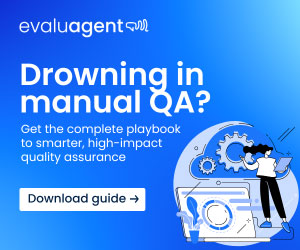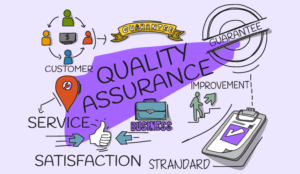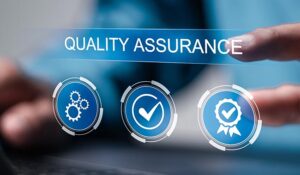A robust Quality Assurance (QA) programme is vital for maintaining high standards in contact centres. By combining technology and effective coaching, contact centres can enhance both performance and engagement.
To find out more, we asked Chris Mounce, Product and Training Specialist at EvaluAgent, for some top suggestions on how contact centres can improve their Quality Assurance (QA).
Video: Tips to Improve Your Quality Assurance
Watch the video below to hear Chris outline four suggestions on how contact centres can improve their Quality Assurance (QA):
With thanks to Chris Mounce, Product and Training Specialist at EvaluAgent, for contributing to this video.
Four Tips to Improve Quality Assurance (QA) in Contact Centres
1.. Focus on Two Key Elements of QA
“Technology can help mitigate a lot of QA challenges. You know, things like automating workflows, seamless integration with CRMs, and of course real-time reporting.
A strong QA programme is made up of two main elements. There is insight, and this element generates all of the performance data through evaluations.
And then number two, it’s people improvement. So that’s things like coaching, one to ones, and learning and development.“
QA programmes are built on two core components:
- Insight Generation – This involves collecting performance data through evaluations. Accurate data is essential for understanding how agents are performing.
- People Improvement – Activities like coaching, one-to-one sessions, and ongoing learning and development help agents improve their skills and address performance gaps.
2. Avoid Common Challenges
“Now most challenges actually relate to the insight part, generating the data, and this part can be pretty laborious.
So there is a risk of it becoming a tick-box exercise. And those subsequent coaching sessions have little value to an agent so QA engagement suffers.”
Generating QA data can be labour-intensive, with the risk of turning evaluations into a tick-box exercise.
When this happens, subsequent coaching loses value, and QA engagement declines. Addressing these challenges requires efficiency and purpose in your QA processes.
3. Leverage QA Technology
Dedicated QA software can significantly streamline workflows and enhance reporting.
“Now dedicated QA software platforms can help. You know the key in overcoming these challenges is seamlessly connected workflows, so you can evaluate conversations as efficiently as possible.
There’s real-time reporting, and being able to get actionable insight quickly and easily.”
Key features include:
- Workflow Automation – Simplifies the evaluation process and reduces manual effort.
- CRM Integration – Ensures seamless data collection and access to relevant customer information.
- Real-Time Reporting – Delivers actionable insights quickly, enabling timely coaching and decision-making.
4. Prioritise Quality Coaching
Higher-quality performance data leads to better coaching conversations. With actionable insights from QA tools, you can engage agents in meaningful discussions that drive performance improvements and keep them motivated.
“So that allows you to focus on the coaching and have enriched conversations with your agents that drive performance. Now with this higher-quality performance data, you will then have higher-quality coaching conversations.”
Investing in technology and focusing on both insight and people improvement can transform your QA processes, resulting in better outcomes for agents and customers alike.
If you are looking for more great insights from the experts, check out these next:
- Tips to Reduce Repeat Contacts
- Why FCR Matters and How to Measure It
- 3 Common Contact Centre QA Challenges
- How to Inspire Agents for Success
Author: Robyn Coppell
Reviewed by: Hannah Swankie
Published On: 31st Oct 2023 - Last modified: 25th Sep 2025
Read more about - Video, Chris Mounce, EvaluAgent, Quality, Videos















